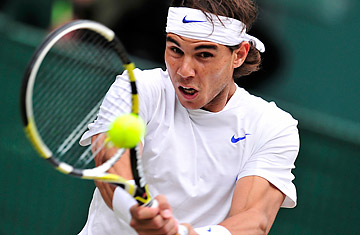
Spain's Rafael Nadal returns the ball to Serbian player Novak Djokovic during the men's single final at Wimbledon in London on July 3, 2011
(2 of 2)
We'll soon find out if Nadal's making excuses. What's now indisputable, however, is that Nadal's mind is not unbreakable. Tennis experts have long ascribed Nadal's 17-8 career record against Federer's to his superior mental toughness — an impressive feat considering Federer's own legendary resolve and self-discipline. Yet it turns out that Nadal's also a bit of a tortured soul. As he spells out in his newly released book, Rafa (written with journalist John Carlin), Nadal was diagnosed with a rare congenital foot condition at the end of 2005. A bone in his foot, called the tarsal scaphoid, started to deform, causing intense pain. A doctor told him he might never play again. His father even brought up the possibility of pursuing a golf career. "How stupid does that sound?" says Nadal during our interview, laughing about that suggestion now. "I cannot be a golf pro when I start playing when I'm 19 years old."
After the doctor's prognosis, Nadal took a dark turn. In the book, he writes that he "sunk into the deepest, blackest hole of my life." He felt "misery day and night," and while resting his foot, he'd "lie for hours on end on the sofa staring into space, or sit in the bathroom, or on the stairs, weeping. I didn't laugh, I didn't smile, I didn't want to talk. I lost all appetite for life." Thankfully, a specialist designed a custom-made shoe for Nadal that cushions the problematic bone. His career still skyrocketed, though the pain does persist, and his team continues to tweak his shoes. "It's a work in progress," he writes. "We still haven't got it absolutely right."
Nadal also had a rough 2009. He won the Australian Open, but he soon found out that his parents would be separating. The news sent him reeling again. "My attitude was bad," Nadal writes. "I was depressed, lacking in enthusiasm." He lost in the fourth round of the French Open, still his only defeat at Roland Garros. He pulled out of Wimbledon, giving up a chance to defend the title he so memorably won over Federer the year before (that 2008 Wimbledon final was the subject of its own book, Strokes of Genius: Federer, Nadal, and the Greatest Match Ever Played). "My knees were the immediate reason," Nadal writes. "But I know the root cause was my state of mind."
Once again Nadal found a way to recover. "The pain, the suffering is not forever," Nadal tells TIME. "I saw my mom get better, my dad get better, my sister get better. I started to get better." He won three straight Grand Slams in 2010 — the French Open, his second Wimbledon and his first U.S. Open. With the U.S. Open victory, he became just the seventh man to win all four Grand Slam titles in his career. At only 25, Nadal is still a prime candidate to top Federer's record (of 16 and counting) for most career Grand Slam singles titles. "My motivation is not to improve upon the Grand Slams of Federer, because that's almost impossible to do," says Nadal. Contrast that outlook to that of Tiger Woods, who has vocalized his desire to break Jack Nicklaus' record for most golf majors. Says Nadal: "So my goal is to enjoy every moment."
Nadal still seems genuinely bemused by all his success, and tennis fans should be smiling too. On the men's side, the game has never been better. Djokovic, 57-2 on the year, is threatening John McEnroe's record for highest single-season winning percentage — in 1984, Johnny Mac went 82-3, a .965 clip. "It's probably impossible to repeat what he's doing this year," Nadal says of Djokovic. "All I can do is congratulate him." Federer is still, well, Federer. He's the only player to beat Djokovic in a full match this year, when he topped him at the French Open. (Andy Murray defeated Djokovic at the final of the Western & Southern Open on Aug. 21, but Djokovic retired in the second set with a sore shoulder, though Murray was up a set when the match ended. Going into the U.S. Open, Djokovic's shoulder is clearly a concern.) Murray, the world's No. 4, seems due for a Grand Slam title.
U.S. fans, mind you, might not feel like celebrating. No American has won a men's Grand Slam title in eight years. Andy Roddick's time has probably passed, and although Fish is improving, a U.S. Open win for him would be a shock. (The women's side is a real disaster. Serena Williams is the highest-seeded American player, at 28th.) But why should American failures mean less tournament buzz and lower ratings? Are we still that parochial in an ever connected world? "We're very fortunate in tennis right now," says Darren Cahill, an ESPN analyst and former coach. "These guys have taken the men's game to a level I don't think we've seen before."
And despite his recent struggles, Nadal could easily surprise the naysayers at this year's U.S. Open. "All my life, I've done it my way," Nadal says. "It doesn't matter what the rest of the people say — if Novak is the favorite, if Federer is the favorite. It doesn't make a difference to me. If I'm going to lose, I'm going to accept loss in the same calm way that I accept the victory. Same thing if I win. That's all."
Sean Gregory is a staff writer at TIME. Keeping Score, his sports column for TIME.com, appears on Fridays. Find him on Twitter at @seanmgregory. You can also continue the discussion on TIME's Facebook page and on Twitter at @TIME.
